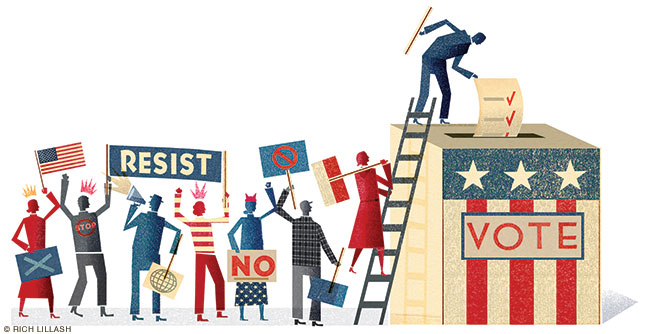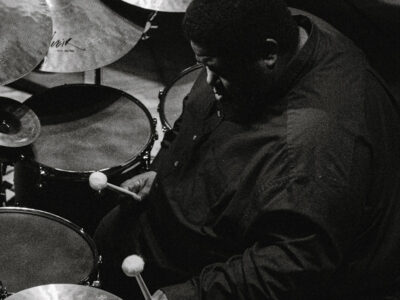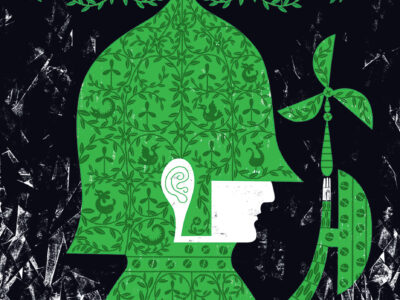
Daniel Gillion’s The Loud Minority traces the impact of protest movements on legislation, voting, and other aspects of American democracy.
In 1995, young Daniel Gillion took part in a Miami satellite protest coordinated with the Million Man March of African American men held in Washington, DC. He carried a banner that was a bit too large for him, and he wondered: Have we made any difference here, or are we just wasting our time?
Gillion wasn’t wasting his time, if only because the protesting teenager turned his question into a fruitful career in political science—a career in which protest has been the focus of his research.
One of eight children growing up in a poor but close-knit family in South Florida, Gillion recalls lively political discussions at home that helped to make politics a natural area of study for him. He joined the faculty at Penn in 2009 and today is the Julie Beren Platt and Marc E. Platt Presidential Distinguished Professor of Political Science. His new book, The Loud Minority: Why Protests Matter in American Democracy (Princeton University Press, 2020) is about the effects of protest on legislation, voting, and other aspects of our political system.
In his view, protest is not merely a chance to let off steam; on the contrary, it’s an important harbinger of new directions. “Protests,” he writes, “are the canaries in the coal mines that warn of future political and electoral change.”
Gillion took some time from the new semester to answer questions from Gazette contributor Daniel Akst C’78 about why protest matters and what we can learn from it.
Your book is about the effects of protest on American democracy. What are some examples of political or social change that first manifested via protest?
The classic example is the civil rights movement that started in the 1950s and carried on to the mid-1960s. As a result we saw the Civil Rights Act of 1964 and the Voting Rights Act of 1965. Recently we witnessed March for Our Lives, which led to the Bipartisan Background Checks Act of 2019. We’ve also seen social change as a result of protest. Take for example the #MeToo movement, which increased awareness of sexual harassment and assault both in and outside the workplace. Black Lives Matter was able to shine a spotlight on racial profiling and police brutality. So you go down the list, we see these movements that occur and then either concrete policies follow or we change the way we view a particular issue.
Can you describe the mechanism whereby protest is transmitted into political change? Is this a function performed by the media?
The way I see protests translating into political change is through the communication of protesters to non-protesters. I believe that protesters and their message are viewed in a light that is already preconceived. When a bystander or an average citizen who’s not engaging in a protest sees, let’s say, the Black Lives Matter movement engaging in activism, they have a preconceived notion of what that group is about. The same would be true of protests around the Second Amendment, regarding holding on to your guns. People have a preconceived notion of whether such protests are liberal or conservative.
In today’s society, every single protest action can take on that liberal or conservative label in the minds of the non-protester. And so the liberal protest of Black Lives Matter links to the liberal protest of the #MeToo Movement, which links to the liberal protest of minimizing gun violence expressed in the March for Our Lives movement. Those protests bring about a snowball effect by Election Day that has liberal voters saying to themselves, OK, it’s important for me to have a liberal politician in office to address these many concerns. And that’s the way protest is able to move from the streets to the ballot box. It actually leads to political change—the election of a politician who represents the concerns of the protesters who have been the most vocal. We could do this same exercise with conservative protests influencing conservative voters and thus leading to conservative politicians.
The media must play a significant role in this.
Absolutely. The media plays a role in amplifying the message. But I believe protests are local actions that influence local-level politics. And so you might have a protest that’s taking place in Philadelphia, and whether a citizen in Philadelphia sees these protests, hears about them, becomes aware of them through the media or some other means, that protest can still have influence. So there’s no doubt the media does a great deal of lifting in making sure a protest is amplified. However, protests in the community can raise resistance sometimes without having the media involved. The key is the ideological link. The fact that this is a liberal or conservative protest is all that needs to be known to increase the salience of an issue and mobilize a corresponding liberal or conservative voter.
Does the costliness of a protest influence its effectiveness? In other words, does it matter if the protesters are seen to pay a high price by withstanding physical attacks or starving or even immolating themselves?
Undoubtedly various characteristics of protest can influence the impact that it has not only in the political arena, but also the way in which citizens view it even before that, and the way the media decides to cover these events. Protest can be a double-edged sword. So for example, when protests are very violent, that definitely expresses the passion involved and makes the protest issue salient. Consequently, the media is more likely to cover the protest event and average people are more likely to hear about it. However, it’s less likely for the average citizen to sympathize with the protestors’ cause. Now this also depends upon what sort of violence we are talking about. Are we talking about violence in which you have the water hose and the dogs used on protesters, or is it this violence in which we have riots taking place? That makes a difference, in terms of the public sympathizing. Nonviolent events are less likely to be covered and less likely to galvanize individuals—but more likely to win public support. Other characteristics of a protest matter too, like the size and duration.
I’m wondering if there is “survivorship bias” here. The protests that live on in memory are precisely those with the greatest impact, but what about all the others that ultimately didn’t amount to anything? Examples include the extensive student pacifist movement of the 1930s and, more recently, Occupy Wall Street. Maybe it’s rare for protests to lead to big changes.
I tend not to look at protests as whether or not they brought about change, but rather at what type of change did they bring about or did they go far enough in securing the response that individuals would want. There is no doubt that when protests occur, they are going to place that issue on the public agenda so people can see what’s going on. I view that as a type of change because now you have changed the discourse on this particular issue.
Protest is constantly moving the needle in one direction or another. Take the blue wave that occurred in the 2018 election. I think there was a shift in Democrats gaining more seats and coming into office because there were a greater number of protests that took place. Will it lead to a new president in 2020? That’s yet to be determined. But the fact that people are changing their perspective on the issue based on protests is just undeniable. So, it’s difficult to track and to quantify what sort of success we’re dealing with, but we have to first clarify: What do we mean by success and change?
You’ve shown how protests can influence democracy. Can protests also be anti-democratic, perhaps by influencing policy in a direction opposed by most voters?
I don’t see protests as being capable of putting forth anti-democratic activity. In the US context, the Founders guarded every citizen’s right to protest via the constitutional right of assembly. So it is something individuals have as a way to voice their opinions and concerns as part of the democratic process. Now of course there are protest messages that are unpopular. But this is actually where protests shine. This is where protest is needed, to express concerns that might not be captured by the majoritarian nature of elections.
Protests have always been a part of the very fabric of American democracy. Think of the original Tea Party protest. Since then, democratic expressions have largely been captured through the voting process. However, protest also expresses the democratic will of the people. These expressions might stem from marginalized segments of society, but they remain important voices that make our democracy more holistic.




